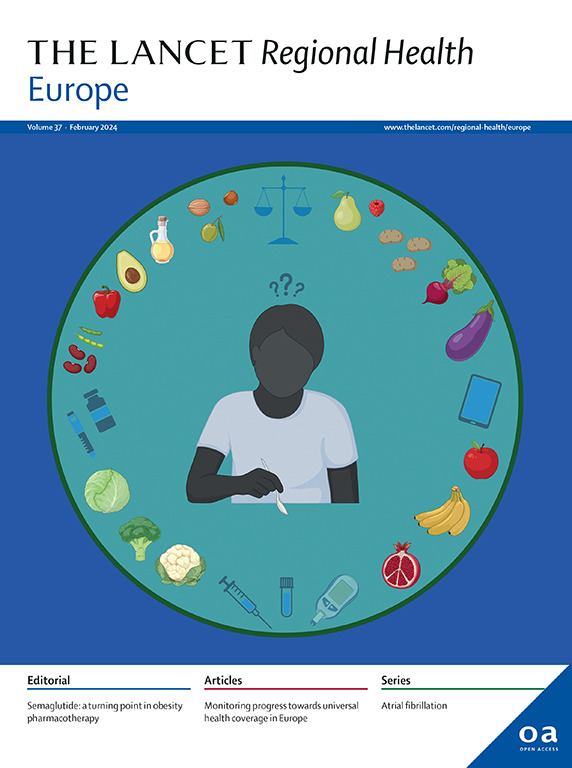Effectiveness of influenza vaccination in preventing severe COPD exacerbations and pneumonia before, during, and after the COVID-19 pandemic: a retrospective cohort study
IF 13
Q1 HEALTH CARE SCIENCES & SERVICES
引用次数: 0
Abstract
Background
Influenza vaccination is recommended to reduce complications and hospitalisations in individuals with COPD. Recent fluctuations in COPD-related hospitalisations underscore the need to evaluate vaccine effectiveness in preventing severe exacerbations and pneumonia across pre-, during-, and post-COVID-19 periods.
Methods
We conducted a retrospective cohort study of Clalit Health Services members with COPD, comparing influenza-vaccinated individuals to matched unvaccinated controls. To reduce bias, we matched vaccinated individuals with unvaccinated controls across 648 subgroups by age, sex, exacerbation history, comorbidities, and vaccination tendency. The primary outcome was hospitalisation for exacerbations or pneumonia during each influenza season (2017–2024), categorised into pre- (2017–2020), during (2020–2022), and post-COVID-19 (2022–2024) periods. We defined each influenza season based on weekly surveillance data reporting influenza circulation, ensuring that comparisons accurately corresponded to the actual periods of influenza virus activity. Subgroup analyses stratified participants by low or high risk based on prior-year exacerbations.
Findings
Among 88,446 COPD patients, severe exacerbations and pneumonia decreased by 20% during the COVID-19 pandemic (2020–2022) but returned to baseline post-pandemic (2022–2024). Vaccine effectiveness in reducing these outcomes was 30% (95% CI: 24–35%) pre-pandemic (2017–2020) but was limited during the pandemic (10%, 95% CI: −5 to 22%) and post-pandemic (−2%, 95% CI: −15 to 8%). High-risk individuals, representing 30% of the COPD population, accounted for over 85% of cases, with vaccine effectiveness showing similar trends across risk groups.
Interpretation
While influenza vaccination remains recommended to reduce complications associated with influenza, its effectiveness in preventing severe exacerbations or pneumonia may be limited during and after the COVID-19 pandemic in individuals with COPD. Additional preventive measures, such as social distancing, should be integrated into public health efforts, especially during periods of heightened respiratory infection circulation and for high-risk individuals.
Funding
This work was supported by the European Research Council, project #949850 and the Israel Science Foundation (ISF), grant No. 3409/19, within the Israel Precision Medicine Partnership program.
在COVID-19大流行之前、期间和之后,流感疫苗接种对预防COPD严重恶化和肺炎的有效性:一项回顾性队列研究
背景:建议接种流感疫苗以减少慢性阻塞性肺病患者的并发症和住院。近期copd相关住院病例的波动突出表明,有必要评估疫苗在预防covid -19之前、期间和之后的严重恶化和肺炎方面的有效性。方法:我们对Clalit Health Services患有COPD的成员进行了一项回顾性队列研究,将接种流感疫苗的个体与未接种流感疫苗的对照组进行比较。为了减少偏倚,我们根据年龄、性别、加重史、合并症和疫苗接种倾向,将648个亚组中接种疫苗的个体与未接种疫苗的对照组进行匹配。主要结局是每个流感季节(2017-2024年)因病情加重或肺炎住院,分为2019冠状病毒病前(2017-2020年)、期间(2020-2022年)和后(2022-2024年)时期。我们根据报告流感流行的每周监测数据来定义每个流感季节,确保比较准确地对应于流感病毒活动的实际时期。亚组分析根据前一年病情恶化的低风险或高风险对参与者进行分层。在88446例COPD患者中,在2019冠状病毒病大流行期间(2020-2022年)严重恶化和肺炎下降了20%,但在大流行后(2022-2024年)恢复到基线水平。疫苗在减少这些结果方面的有效性在大流行前(2017-2020年)为30% (95% CI: 24-35%),但在大流行期间(10%,95% CI: - 5 - 22%)和大流行后(- 2%,95% CI: - 15 - 8%)有限。高风险个体占慢性阻塞性肺病人群的30%,占病例的85%以上,疫苗有效性在风险群体中显示出类似的趋势。虽然流感疫苗接种仍被推荐用于减少流感相关并发症,但在COVID-19大流行期间和之后,其在预防COPD患者严重恶化或肺炎方面的有效性可能有限。应将社交距离等其他预防措施纳入公共卫生工作,特别是在呼吸道感染循环加剧期间和高危人群。这项工作得到了欧洲研究理事会项目#949850和以色列科学基金会(ISF)的资助,赠款号3409/19,属于以色列精准医学合作伙伴计划。
本文章由计算机程序翻译,如有差异,请以英文原文为准。
求助全文
约1分钟内获得全文
求助全文
来源期刊

Lancet Regional Health-Europe
Multiple-
CiteScore
19.90
自引率
1.40%
发文量
260
审稿时长
9 weeks
期刊介绍:
The Lancet Regional Health – Europe, a gold open access journal, is part of The Lancet's global effort to promote healthcare quality and accessibility worldwide. It focuses on advancing clinical practice and health policy in the European region to enhance health outcomes. The journal publishes high-quality original research advocating changes in clinical practice and health policy. It also includes reviews, commentaries, and opinion pieces on regional health topics, such as infection and disease prevention, healthy aging, and reducing health disparities.
 求助内容:
求助内容: 应助结果提醒方式:
应助结果提醒方式:


